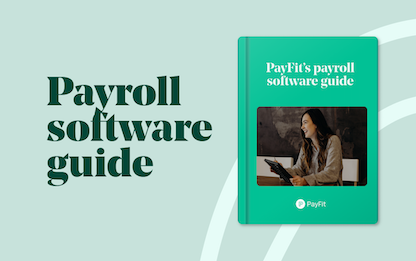- Blog
- |Managing Payroll
- >Payroll
- >payroll-bureau-and-outsourcing-payroll-compared
What are Payroll Bureaus, and How Are They Different From Outsourcing?


Running a company without an operational payroll process is like driving a car without a fuel pump. Sooner or later, fuel doesn’t get to the engine, and it stops working — making the car come to a grinding halt.
Without receiving payment for their work on time, your employees, too, will likely become disenfranchised and unmotivated to work.
However, payroll involves more than just paying employees. It also includes making accurate salary deductions, submitting the correct forms (like FPS & EPS) to HMRC, and complying with other UK payroll and tax laws. (Check out our blog on FPS submission once you've read this piece).
Considering how delicate the payroll process is, with little to no room for error, some companies use payroll bureaus to handle their payroll process.
This guide will explore what payroll bureaus are, how they work, their benefits, downsides, how they differ from outsourcing payroll, and so much more.
What is a payroll bureau?
A payroll bureau offers businesses a hybrid payroll service that combines the efforts of your internal payroll team with an outsourced team of experts.
The payroll bureau handles specific payroll processes like providing HMRC with information, processing payments & expenses, preparing payroll reports, and processing and sending out payslips.
As the payroll bureau handles these specific responsibilities, you’ll likely still need an in-house team to manage other internal payroll processes.
What is the difference between a payroll bureau and outsourcing?
You might be wondering, “A payroll bureau sounds a whole lot like outsourced payroll,” and you won’t be wrong.
These two share a lot of similarities, but there is a difference that tells them apart from one another.
Payroll bureaus handle specific payroll processes you don’t want to handle internally — whether because of how monotonous it gets or because you don’t have an in-house specialist.
Most of the time, when using payroll bureaus, organisations usually still have an in-house team and have a measure of control over the entire payroll operation.
On the other hand, with an outsourced payroll service, organisations are handing over their entire payroll process to a third-party company. This third-party company is expected to have a team of experts who will help you handle your payroll from top to bottom.
The bottom line about the difference between payroll bureaus and outsourced payroll is that with payroll bureaus, you can choose how much control you want to have over the entire process.
What are the benefits of a payroll bureau?
Some savings on time and effort
Payroll processes often take up a large chunk of time. With a payroll bureau handling some parts of the payroll process, you could free up time some of that time for your team. But it’s also worth noting most payroll bureaus won’t offer a comprehensive service - some payroll tasks you’ll still need to work on in-house.
Compliance with laws and regulations
Ensuring you’re compliant with the law is a significant aspect of payroll. However, considering these laws change over time, it can be easy to miss them. A payroll bureau is a team made up of payroll experts that can advise you on how to stay compliant and ensure legislation is followed in doing your payroll. Most importantly, they can deal with government bodies like HMRC for you.
Reductions in errors
Handling payroll often requires specialisation and concentration to avoid calculation or data entry errors. Payroll bureaus provide a consistent level of precision that helps limit payroll errors. Though there are alternatives (like automation) that can provide even higher levels of accuracy.
What are the downsides of a payroll bureau?
While there are certain benefits to using a payroll bureau, there are a number of downsides to engaging this kind of outsourced service.
Retainer costs & additional fees
Most payroll bureaus work on a monthly retainer. And the fees they end up charging you may vary greatly based on where your business is located, its headcount, the frequency of your pay cycle as well as tax deductions.
On top of this, payroll bureaus can charge you additional fees for services outside your initial scope of work. Think things like processing pensions, benefits reporting and end-of-tax-year preparation. Even worse, some of these outsourced providers may not even provide support for these additional tasks, leaving your team to have to pick up the slack.
Time-wasted due to poor communication
One of the biggest disadvantages we hear about payroll bureaus is time wasted due to miscommunication.
Firstly you have to send all your payroll data (more on this later) to an additional outside stakeholder. The gap between when you send this information and its received and processed is usually the number one reason employee pay gets delayed.
On top of this, there’s a lot that can get lost in translation when working with an outside service. Whether it’s the wrong spreadsheet that gets copied or a specific department failing to submit the right information, there are a lot of risks that incorrect information gets passed on.
And that leads us to our next point about collating and sending information.
Risks when transferring company data
When it comes to protecting your data, not all payroll bureaus operate at the highest standards. Some of the systems they use (think clunky, old legacy portals) may be prone to data breaches from cyber attacks. And this is a problem, especially as your payroll information is some of the most sensitive data your business owns.
Errors due to miscalculation and poor compliance
While one of the biggest advantages of payroll bureaus is their level of expertise, there’s a flip side to this. And that’s because most payroll bureaus are human-intensive.
While experts in their field, these payroll experts are human at the end of the day. Just like the rest of us, they get tired, overworked and sometimes have bad days. Unfortunately, this might lead to the very errors your business is trying to avoid slipping through the net.
Now we’re not saying by any stretch of the imagination that payroll experts are a bad investment. On the contrary, they can bring incredible value to the table. And when their expertise is combined with tools like automated payroll software? Well, that can be game-changing (more on this later).
You still need an in-house team
Initially, you might think having a payroll bureau on retainer means you can disband your in-house team. But as explored a little earlier, while most of your payroll tasks are typically handed over to a bureau, you still have to handle some responsibilities internally.
As such, you’ll still need people you can rely on to manage payroll within your HR or Finance team. And while this would be the case anyways, with or without outsourced support, these team members may find they’re out of depth when it comes to these tasks.
That’s especially true if there’s still a level of compliance involved in completing certain tasks. So you’ll need to invest in that person’s training and support them to keep up with new standards and legislation changes.
Lack of efficiency
Finally, one of the biggest disadvantages of payroll bureaus is that they often don’t employ best-in-class technology to manage your payroll. Complex calculations and manual or spreadsheet-heavy tasks can all be automated these days, which means there are better solutions out there to completing your pay run.
Is there an alternative to using a payroll bureau?
After considering the pros and cons of using a payroll bureau, you may be keen to understand the alternative solutions that are out there for dealing with payroll.
And the good news is there are alternatives. And they aren’t to build a robust internal team or to outsource all your entire payroll processes to a third-party company. Instead, it’s to take a best-of-both-worlds approach; In other words, to combine your existing internal team with in-house payroll software. Read our post on in house payroll vs. outsourcing to find out more.
By doing this, you get to keep control over your operation while enjoying the benefits of outsourcing at a fraction of the cost and effort. Here are some ways payroll software, like PayFit, can help you.
Saves time - With payroll software, you can save time on tasks, as most processes are automated, and there is no back-and-forth communication.
Ensures compliance - PayFit is an HMRC-recognised payroll software that handles all HMRC submissions on your behalf.
Offers integrations - Integrations allow payroll software to work seamlessly with your other tools, saving you time while allowing you to scale operations.
Support from experts - Even if you don’t have a payroll expert, PayFit has a team of experts who can always provide you with personalised help and support.
Generate data reports - You can create customised reporting to see your business operation from a payroll standpoint.
Manage your payroll with PayFit
Although using a payroll bureau is a great way to handle your payroll, you can get similar benefits and more through in-house payroll software.
Book a demo today to learn how PayFit can help you manage your payroll.


The 2024 UK National Living Wage - An Employer’s Guide

The Cost Of Recruitment In The UK - What You Might Not Know

UK National Insurance Changes for January 2024

End Of Tax Year 2023/2024 - Eight Key Changes For 24/25

Strategies to Reduce Employee Turnover

